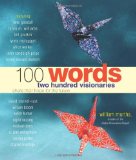William Murtha has just come out with a new book, 100 Words: Two Hundred Visionaries Share Their Hope for the Future. The book has plenty of visionaries and my words as well…
At the time, I was reflecting on Teilhard de Chardin’s prophetic writings about the nature of the noosphere and how the very nature of our suffering as well as the global threats to our planet would usher in a new form of consciousness.
Here are my 120 words:
If I were to look into the future, I’d see the living envelope of life, our biosphere, becoming more fragile. As I scanned further, I would also note something else, an energy force surrounding the biosphere, crackling with spiritual energy. In small groups and through millions of networks, I would observe healing actions that signified our collective potential. Looking further, I would see a circle of humanity creating a future that honored our interconnectedness. These first millions would be heralds of a new consciousness. They would grasp the co creative power of solving problems together. Rather than fearing the loss of their individuality, they would form associations that respected human differences and each others’ talents. This would be collective wisdom.



At the risk of seeming callous or insensitive without meaning to, I’d suggest that the endless stream of human ideas to “be the change” or to “make a difference,” or otherwise fix the planet, are folly and hubristic folly at that. How do we know what is broken when many of us also resort to spiritual positions which tell us life is perfect as is? And how much of what we notice as broken can be attributed to our inability to see God in all things, as opposed to suffering? There is no “new” consciousness, any more than there is time. It is always now and that is not new at all. Just awareness. It seems to me that our well intended efforts to change things suggest a fear and separation that in itself is a problem. Again, I don’t mean to sound callous or ignore the pain people endure, just to remind us that for all the changes we enact, there doesn’t seem to be much less suffering going around. Doesn’t that tell us something too?
Gary’s remarks remind me of Mother Teresa’s doubts. In her letters we find that she struggled with the notion that all her efforts were for naught, that she never really felt the presence of Jesus, and that she even had doubts about the very existence of God. I hope she found some solace in Jesus’ own dark night of the soul in Gethsemane, or from his utterance on the cross, “Father, why hast thou forsaken me?” What’s the point? Camus’ “Myth of Sisyphus” comes to mind, and how our existential reality must be embraced for what it is: an absurd struggle in which we find content in the work.
Dr. Robert Langs, psychiatrist and author, offers two theories: the Emotion-Processing Mind, describing the inner workings of the mind that have evolved over time, and Death Anxiety, which holds sway over how we behave, and is the underpinning of our conscientiousness, larger even than Freud’s theory of sexuality. In our conversations, given how the mind works and how we are forced to behave, Langs was troubled that the point we find ourselves in our evolution may not be enough to allow us to overcome our differences, to overcome strife at the personal and macro level. Musing on this I remembered my Hindu and Buddhist teachings that tell us that only after innumerable lifetimes will all beings reach liberation. The ancients were talking about the evolution of humanity’s moral core, another of Langs’ concepts. Thousands of years ago they understood that this is no easy task, and it will take us a very long time to overcome our shortcomings, but we must accept these limitations, and trust that we will achieve the desired results.